-
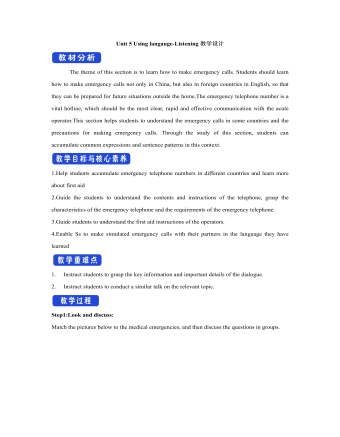
新人教版高中英语选修2Unit 5 Using langauge-Listening教学设计
The theme of this section is to learn how to make emergency calls. Students should learn how to make emergency calls not only in China, but also in foreign countries in English, so that they can be prepared for future situations outside the home.The emergency telephone number is a vital hotline, which should be the most clear, rapid and effective communication with the acute operator.This section helps students to understand the emergency calls in some countries and the precautions for making emergency calls. Through the study of this section, students can accumulate common expressions and sentence patterns in this context. 1.Help students accumulate emergency telephone numbers in different countries and learn more about first aid2.Guide the students to understand the contents and instructions of the telephone, grasp the characteristics of the emergency telephone and the requirements of the emergency telephone.3.Guide students to understand the first aid instructions of the operators.4.Enable Ss to make simulated emergency calls with their partners in the language they have learned1. Instruct students to grasp the key information and important details of the dialogue.2. Instruct students to conduct a similar talk on the relevant topic.Step1:Look and discuss:Match the pictures below to the medical emergencies, and then discuss the questions in groups.

《念奴娇·赤壁怀古》说课稿(二) 2022-2023学年统编版高中语文必修上册
读,是学生接触作品最直接的方式。初读词作,让学生听示范读,并且在课本注解的提示下,解决词作的读音问题。再进一步了解词人情况、本词的创作背景以及怀古咏史诗词的基本情况。通过齐读的方式,亲身感受词作的音韵之美。读,是放飞想象的最好方式。再读词作,通过诵读上阙内容,想象上阙描绘了一幅什么样的情景?用了哪些富有表现力的词来极力描绘这些景象?呈现出何种意境?有何作用?并且利用智慧课堂进行填空和选择。读,是把握内容的最有用的方式。通过智慧课堂随机选择,引导学生分角色诵读下阙,分析三国时的周瑜与此时的词人苏轼的形象。在对比中,感受周瑜的情场、官场、战场,场场得意的情况,和苏轼的黄州、惠州、儋州,州州失意的人生境遇。理解周瑜之于苏轼而言,是某种程度上热切向往的和难以企及的梦。读,也是赏析体悟作品主要方式。学生再次齐读下阙,赏析词作最后两句“人生如梦,一尊还酹江月”表达了作者怎样的情感?来完成本篇内容的学习。
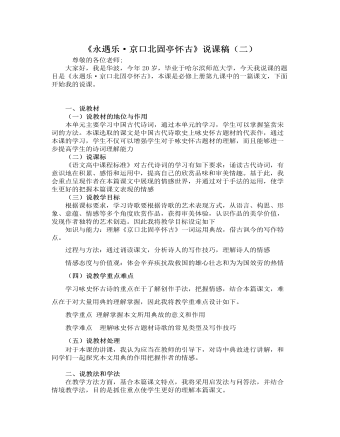
《永遇乐 · 京口北固亭怀古》说课稿(二) 2021-2022学年统编版高中语文必修上册
此环节运用的是合作探究法,采用小组讨论的形式开放回答即可。通过本课的学习,学生可以总结归纳出辛弃疾主张抗敌,收复失地的爱国热情对南宋政府苟且偏安的不满,吸取的历史教训,告诫当使用者不要草率用兵。对于决策者提出警告,抒发自己壮志难酬的感慨,教师总结归纳即可。本诗写出最大特点就是大量典故的运用。学生可以本诗对用点表达自己的看法,我将在在PPT展示诗歌用典的意义,意在帮助学生理解更好用典这种诗歌技巧。本篇是一首咏史怀古诗,本单元学习了两首同题材诗歌,有必要使学生掌握一类型的诗歌鉴赏方法。(五)比较阅读 品味历史这一环节PPT将展示上次课程学习的《念奴娇赤壁怀古》并从内容,形式等角度分析异同,采用提问的方法。此环节结束后简要归纳咏史怀古诗类型。目的是巩固加强对于咏史怀古题材诗歌理解,理解归纳咏史怀古诗题材类型。(六)布置作业 巩固感知鉴赏李白《越中览古》我将采用习题的形式,目的是使学生在实践中运用所学方法鉴赏咏史怀古诗。
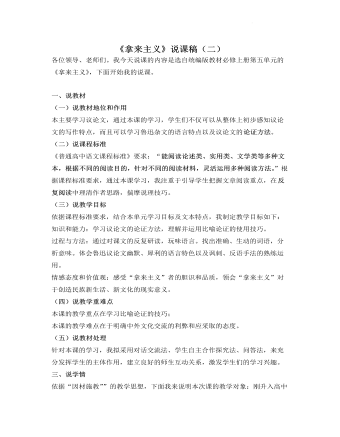
《拿来主义》说课稿(二) 2021-2022学年统编版高中语文必修上册
四、说教学过程(一)结合现实、自然导入随着我国开放的深入发展,国外的科学、文化、技术以及资产阶级的腐朽思想,生活作风等等也随之大量涌来,我们应采取怎样的态度和方法才是正确的呢?鲁迅先生在30年代就继承文化遗产问题曾写过一篇杂文,我们可以从中获得那些启示呢?(二)整体感知、疏瀹文意1.请同学介绍“我所知道的鲁迅”,教师补充写作背景。教师有针对性的进行预习检查,能促使学生养成课前预习的习惯。2.理清文章的思路,分析文章的整体结构教师范读课文,针对较难的字音进行正读。学生快速浏览课文,把握全文框架,小组讨论后分出层次。(让学生通过自主合作探究来概括文意可以让同学们参与到教学活动中,锻炼学生实际动手能力)
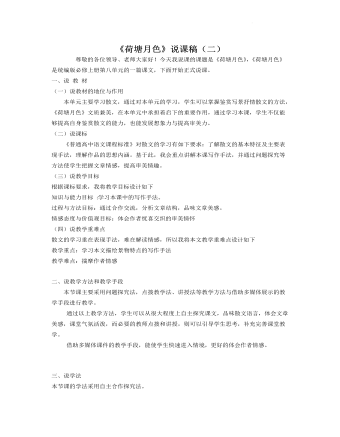
《荷塘月色》说课稿 (二)2021-2022学年统编版高中语文必修上册
本环节利用多媒体展示的教学手段,通过创设优美的情景来渲染气氛,引导学生接受美的熏陶,增强学生学习兴趣。教师先播放莲花的图片,让学生们谈谈自己联想到的诗词曲赋或文章,来激发学生的学习热情,随后教师总结,引出现代写荷花的名篇《荷塘月色》,从而导入新课。导语部分的设计既给了学生美感享受又自然的导入了新课。(二)初读文本,把握结构本环节主要采用了小组合作法让学生以小组合作的形式探索文章夜游顺序和情感变化这两条线索发展,教师适当的进行点拨,让学生通过探索文章线索完成对本课“圆形结构”把握。目的是发挥学生主导作用,自主学习、把握文章结构美。(三)选读文本,分析手法在本环节中主要运用讲授法和问答法。让学生反复诵读课文第4、5、6段,找出作者使用修辞手法修饰了的景物,随后师生问答作者运用了什么修辞手法来描写“荷塘”“月色”“荷花”“荷香”等景物的,又达到了什么样的效果呢?最后由教师来具体讲解本文中学生不熟悉的写作手法(如:通感)。
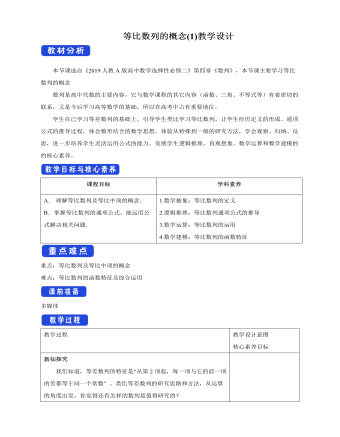
人教版高中数学选择性必修二等比数列的概念 (1) 教学设计
新知探究我们知道,等差数列的特征是“从第2项起,每一项与它的前一项的差都等于同一个常数” 。类比等差数列的研究思路和方法,从运算的角度出发,你觉得还有怎样的数列是值得研究的?1.两河流域发掘的古巴比伦时期的泥版上记录了下面的数列:9,9^2,9^3,…,9^10; ①100,100^2,100^3,…,100^10; ②5,5^2,5^3,…,5^10. ③2.《庄子·天下》中提到:“一尺之锤,日取其半,万世不竭.”如果把“一尺之锤”的长度看成单位“1”,那么从第1天开始,每天得到的“锤”的长度依次是1/2,1/4,1/8,1/16,1/32,… ④3.在营养和生存空间没有限制的情况下,某种细菌每20 min 就通过分裂繁殖一代,那么一个这种细菌从第1次分裂开始,各次分裂产生的后代个数依次是2,4,8,16,32,64,… ⑤4.某人存入银行a元,存期为5年,年利率为 r ,那么按照复利,他5年内每年末得到的本利和分别是a(1+r),a〖(1+r)〗^2,a〖(1+r)〗^3,a〖(1+r)〗^4,a〖(1+r)〗^5 ⑥
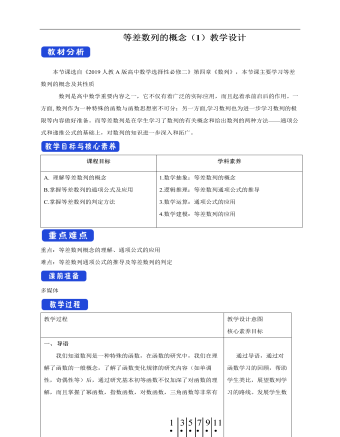
人教版高中数学选择性必修二等差数列的概念(1)教学设计
我们知道数列是一种特殊的函数,在函数的研究中,我们在理解了函数的一般概念,了解了函数变化规律的研究内容(如单调性,奇偶性等)后,通过研究基本初等函数不仅加深了对函数的理解,而且掌握了幂函数,指数函数,对数函数,三角函数等非常有用的函数模型。类似地,在了解了数列的一般概念后,我们要研究一些具有特殊变化规律的数列,建立它们的通项公式和前n项和公式,并应用它们解决实际问题和数学问题,从中感受数学模型的现实意义与应用,下面,我们从一类取值规律比较简单的数列入手。新知探究1.北京天坛圜丘坛,的地面有十板布置,最中间是圆形的天心石,围绕天心石的是9圈扇环形的石板,从内到外各圈的示板数依次为9,18,27,36,45,54,63,72,81 ①2.S,M,L,XL,XXL,XXXL型号的女装上对应的尺码分别是38,40,42,44,46,48 ②3.测量某地垂直地面方向上海拔500米以下的大气温度,得到从距离地面20米起每升高100米处的大气温度(单位℃)依次为25,24,23,22,21 ③

人教版高中数学选择性必修二等差数列的前n项和公式(1)教学设计
高斯(Gauss,1777-1855),德国数学家,近代数学的奠基者之一. 他在天文学、大地测量学、磁学、光学等领域都做出过杰出贡献. 问题1:为什么1+100=2+99=…=50+51呢?这是巧合吗?试从数列角度给出解释.高斯的算法:(1+100)+(2+99)+…+(50+51)= 101×50=5050高斯的算法实际上解决了求等差数列:1,2,3,…,n,"… " 前100项的和问题.等差数列中,下标和相等的两项和相等.设 an=n,则 a1=1,a2=2,a3=3,…如果数列{an} 是等差数列,p,q,s,t∈N*,且 p+q=s+t,则 ap+aq=as+at 可得:a_1+a_100=a_2+a_99=?=a_50+a_51问题2: 你能用上述方法计算1+2+3+… +101吗?问题3: 你能计算1+2+3+… +n吗?需要对项数的奇偶进行分类讨论.当n为偶数时, S_n=(1+n)+[(2+(n-1)]+?+[(n/2+(n/2-1)]=(1+n)+(1+n)…+(1+n)=n/2 (1+n) =(n(1+n))/2当n为奇数数时, n-1为偶数
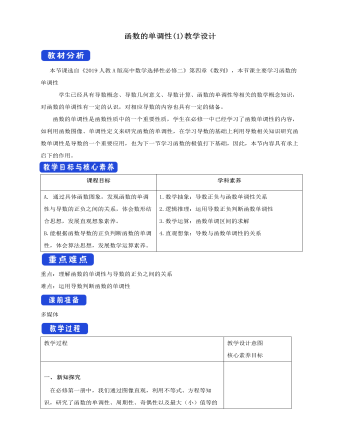
人教版高中数学选择性必修二函数的单调性(1) 教学设计
1.判断正误(正确的打“√”,错误的打“×”)(1)函数f (x)在区间(a,b)上都有f ′(x)<0,则函数f (x)在这个区间上单调递减. ( )(2)函数在某一点的导数越大,函数在该点处的切线越“陡峭”. ( )(3)函数在某个区间上变化越快,函数在这个区间上导数的绝对值越大.( )(4)判断函数单调性时,在区间内的个别点f ′(x)=0,不影响函数在此区间的单调性.( )[解析] (1)√ 函数f (x)在区间(a,b)上都有f ′(x)<0,所以函数f (x)在这个区间上单调递减,故正确.(2)× 切线的“陡峭”程度与|f ′(x)|的大小有关,故错误.(3)√ 函数在某个区间上变化的快慢,和函数导数的绝对值大小一致.(4)√ 若f ′(x)≥0(≤0),则函数f (x)在区间内单调递增(减),故f ′(x)=0不影响函数单调性.[答案] (1)√ (2)× (3)√ (4)√例1. 利用导数判断下列函数的单调性:(1)f(x)=x^3+3x; (2) f(x)=sinx-x,x∈(0,π); (3)f(x)=(x-1)/x解: (1) 因为f(x)=x^3+3x, 所以f^' (x)=〖3x〗^2+3=3(x^2+1)>0所以f(x)=x^3+3x ,函数在R上单调递增,如图(1)所示

人教版高中数学选择性必修二等比数列的前n项和公式 (1) 教学设计
新知探究国际象棋起源于古代印度.相传国王要奖赏国际象棋的发明者,问他想要什么.发明者说:“请在棋盘的第1个格子里放上1颗麦粒,第2个格子里放上2颗麦粒,第3个格子里放上4颗麦粒,依次类推,每个格子里放的麦粒都是前一个格子里放的麦粒数的2倍,直到第64个格子.请给我足够的麦粒以实现上述要求.”国王觉得这个要求不高,就欣然同意了.假定千粒麦粒的质量为40克,据查,2016--2017年度世界年度小麦产量约为7.5亿吨,根据以上数据,判断国王是否能实现他的诺言.问题1:每个格子里放的麦粒数可以构成一个数列,请判断分析这个数列是否是等比数列?并写出这个等比数列的通项公式.是等比数列,首项是1,公比是2,共64项. 通项公式为〖a_n=2〗^(n-1)问题2:请将发明者的要求表述成数学问题.
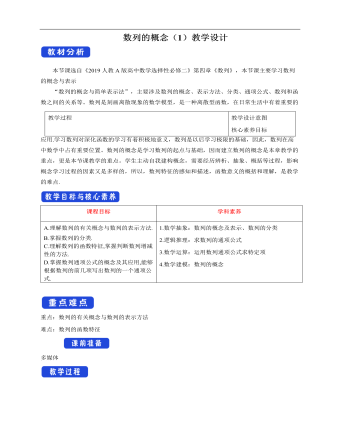
人教版高中数学选择性必修二数列的概念(1)教学设计
情景导学古语云:“勤学如春起之苗,不见其增,日有所长”如果对“春起之苗”每日用精密仪器度量,则每日的高度值按日期排在一起,可组成一个数列. 那么什么叫数列呢?二、问题探究1. 王芳从一岁到17岁,每年生日那天测量身高,将这些身高数据(单位:厘米)依次排成一列数:75,87,96,103,110,116,120,128,138,145,153,158,160,162,163,165,168 ①记王芳第i岁的身高为 h_i ,那么h_1=75 , h_2=87, 〖"…" ,h〗_17=168.我们发现h_i中的i反映了身高按岁数从1到17的顺序排列时的确定位置,即h_1=75 是排在第1位的数,h_2=87是排在第2位的数〖"…" ,h〗_17 =168是排在第17位的数,它们之间不能交换位置,所以①具有确定顺序的一列数。2. 在两河流域发掘的一块泥板(编号K90,约生产于公元前7世纪)上,有一列依次表示一个月中从第1天到第15天,每天月亮可见部分的数:5,10,20,40,80,96,112,128,144,160,176,192,208,224,240. ②

人教A版高中数学必修一用二分法求方程的近似解教学设计(1)
《数学1必修本(A版)》的第五章4.5.2用二分法求方程的近似解.本节课要求学生根据具体的函数图象能够借助计算机或信息技术工具计算器用二分法求相应方程的近似解,了解这种方法是求方程近似解的常用方法,从中体会函数与方程之间的联系;它既是本册书中的重点内容,又是对函数知识的拓展,既体现了函数在解方程中的重要应用,同时又为高中数学中函数与方程思想、数形结合思想、二分法的算法思想打下了基础,因此决定了它的重要地位.发展学生数学直观、数学抽象、逻辑推理和数学建模的核心素养。课程目标 学科素养1.通过具体实例理解二分法的概念及其使用条件.2.了解二分法是求方程近似解的常用方法,能借助计算器用二分法求方程的近似解.3.会用二分法求一个函数在给定区间内的零点,从而求得方程的近似解. a.数学抽象:二分法的概念;b.逻辑推理:运用二分法求近似解的原理;

新人教版高中英语必修3Unit 4 Space Exploration-Listening&Speaking&Talking教学设计二
The themes of this part are “Talk about how to become an astronaut” and “Talk about life in space”. As Neil Armstrong said “Mystery creates wonder and wonder is the basis of man’s desire to understand. Space is difficult for human to reach, therefore, humans are full of wonders about it. However, if wanting to achieve the dream of reaching the Moon, some of our human should work hard to be an astronaut at first. Part A(Talk about how to become an astronaut) is a radio interview in a radio studio, where the host asked the Chinese astronauts about his story how to become an astronaut. Yang Liwei told his dreamed to be an astronaut since childhood. Then he worked hard to get into college at 22. The next 10 years, he gradually became an experienced pilot. At the same time, to be an astronaut, he had to study hard English, science and astronomy and trained hard to keep in good physical and mental health and to practise using space equipment. Part B (Talk about life in space) is also an interview with the astronaut Brown, who is back on the earth. The host Max asked about his space life, such as his emotion about going back the earth, the eating, shower, brushing, hobbies and his work. Part A and Part B are interviews. So expressing curiosity about the guests’ past life is a communicative skill, which students should be guided to learn.1. Students can get detailed information about how Yang Liwei became an astronaut and Max’s space life.2. Students learn to proper listening strategy to get detailed information---listening for numbers and taking notes.3. Students can learn related sentences or phrases to express their curiosity like “ I wish to know...” “I’d love to know...”4. Students can learn more about the space and astronauts, even be interested in working hard to be an astronaut

新人教版高中英语必修3Unit 5 The value of money-Reading and Thinking教学设计二
? Could you offer me some kind of work here?? I don’t want your charity, I just want an honest job.? Careless: I landed in Britain by accident.Step 7:Consolidation.? Find Henry? Roderick and Oliver were I .making a bet when they saw Henry, a poor young man. ? Know Henry? About a month ago, Henry was sailing and later he found himself carried out to sea by a strong wind. Fortunately, he 2.was spotted by a ship. And it was the ship that brought him to 3.England? Offer money to Henry ? Oliver and Roderick gave Henry a letter and told him that there was money in it. They 4.persuaded him to accept it, and made him 5.promise that it wouldn't be opened until 2 o'clock.Step 8:Language pointsa large amount of: a large quantity of; a great deal ofe.g. They bought a large amount of furniture before they moved their new house.make a bet: make an arrangement to risk money, etc. on an event of which the result is doubtful.e.g. We made a bet on the result of the match.permit sb to do something: allow somebody to do somethinge.g. My mother doesn’t permit me to ride in the street after it rained.by accident: as a result of chancee.g. I only found it by accident.stare at: look at somebody or something with the eyes wide open in a fixed gaze( in astonishment, wonder, fear, etc)to be honest: to tell you the truth; to be franke.g. To be honest, I don’t think we have a chance of winning.Step7 Homework:What do you think will happen to Henry? Will the bank-note help him or get him into trouble?

新人教版高中英语必修3Unit 4 Space Exploration-Reading for Writing教学设计二
⑦在我看来, 探索太空是值得的。As far as I am concerned, it is worthwhile to explore the space.Step 10 Writing---draftRecently, students in our class have had heated a discussion on whether space is worth exploring. Students hold different ideas about it.30% of us think space exploration is not worthwhile. They think space is too far away from us and our daily life and is a waste of money. And the money spent on space exploration can be used to solve the earth’s problems such as starvation and pollution.On the other hand,70% think space is worth exploring because we have benefited a lot from it,such as using satellites for communication and weather forecast. What’s more,with further space research,we may solve the population problem by moving to other planets one day. Also,space research will enable us to find new sources to solve the problem of energy shortages on the earth.As far as I am concerned, it is worthwhile to explore the space. Not only can it promote the development of society but also enrich our life. Step 11 Pair workExchange drafts with a partner. Use this checklist to help your partner revise his/her draft.1.Does the writer explain why he/she changed/wanted to change?2.Does the writer tell how the changes have improved or will improve his/her life?3.Is the text well-organised?4.Does the writer use words and expressions to show similarities and differences?5.Are there any grammar or spelling errors?6.Does the writer use correct punctuation?

新人教版高中英语必修3Unit 5 The Value of Money-Reading for Writing教学设计二
2. 您能看到, 我头发太长了。You can see that my hair is much too long.3. 无论什么时候, 只要您想回来就回来。Please come back whenever you want.4. 您仅有很少的头发要理! You only have too little hair to cut !5. 为您服务是我的荣幸!It is my honour to serve you!Step 9 Writing(Henry is walking down the street when he sees a sign for a place that cuts hair. He decides to have it cut. )H=Henry B=BarberH: Good afternoon, I’d like to have my hair cut, if I may. (The barber looks at Henry’s hair and continues cutting another man’s hair. ) Er, I’d really like a haircut. As you can see it’s much too long. B: (in a rude manner) Yes, I can see that. Indeed, I can. H: Fine, well, I’ll have a seat then. (He sits in one of the barber’s chairs. The barber turns to look at Henry. )B: It’s quite expensive here, you know! Are you sure you can afford it?H: Yes. I think so. (After his hair is cut, the barber tells Henry how much he must pay. Henry shows the barber the bank note. )B: Why Mr. . . (looks shocked)H: Adams. Henry Adams. I’m sorry. I don’t have any change. B: Please don’t worry! (wearing a big smile) Nothing to worry about! Nothing at all! Please come back whenever you want, even if you only have too little hair to cut! It will be my honour to serve you!Step 10 Pair workExchange drafts with a partner. Use this checklist to help your partner revise his/her draft.1. Are all the elements of a play included and in good order ?2. Do the character use suitable language ?3. Are the stage directions clear and useful ?4. Is the plot clear and exciting enough ?

新人教版高中英语必修3Unit 4 Space Exploration-Reading and Thinking教学设计二
The theme of this unit focuses on “space exploration.” Students will learn about the training and experience needed to become an astronaut. The text is mainly about the development of space exploration. On the one hand, the text helps students to have a good understanding about the great feats humans have achieved, on the other hand, they will further understand the contributions that we Chinese have achieved, and feel confident and proud about our homeland and strengthen their love for our country. The teacher should instruct students to aim high and study harder to make great progress in the space career if possible.1. Read about the development and value of space exploration.2. Explore the mysteries of the universe and the achievements in space exploration.3. Skillfully use the vocabulary of this text to cultivate self-study ability 4. Develop cooperative learning ability through discussion.1. Enable the Ss to talk about the development and value of space exploration.2. Guide the Ss to summarize the main idea of each paragraph as well as the main idea of the text.3. Help Ss comprehend the main reasons for space exploration. Multi-media, textbook, notebooks.Step 1: Warming up and predictionLook at the title and the pictures of the text and predict what the text will be about?2. What are the main reasons for space exploration?
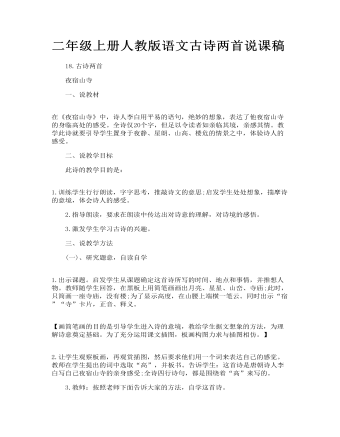
二年级上册人教版语文古诗两首说课稿
二、说教学目标 此诗的教学目的是: 1.训练学生行行朗读,字字思考,推敲诗文的意思;启发学生处处想象,揣摩诗的意境,体会诗人的感受。 2.指导朗读,要求在朗读中传达出对诗意的理解,对诗境的感悟。 3.激发学生学习古诗的兴趣。 三、说教学方法 (一)、研究题意,自读自学 1.出示课题。启发学生从课题确定这首诗所写的时间、地点和事情,并推想人物。教师随学生回答,在黑板上用简笔画画出月亮、星星、山峦、寺庙;此时,只简画一座寺庙,没有楼;为了显示高度,在山腰上端横一笔云。同时出示“宿”“寺”卡片,正音、释义。 【画简笔画的目的是引导学生进入诗的意境,教给学生据文想象的方法,为理解诗意奠定基础。为了充分运用课文插图,板画构图力求与插图相仿。】 2.让学生观察板画,再观赏插图,然后要求他们用一个词来表达自己的感觉。教师在学生提出的词中选取“高”,并板书。告诉学生:这首诗是唐朝诗人李白写自己夜宿山寺的亲身感受;全诗四行诗句,都是围绕着“高”来写的。
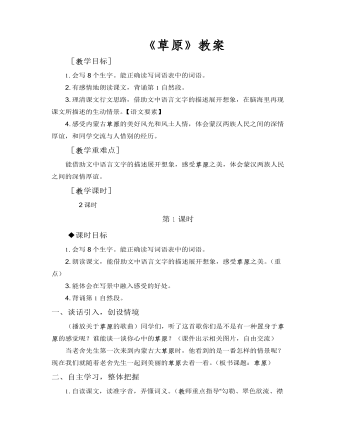
部编版六年级语文上册《草原》教案
1.会写8个生字。能正确读写词语表中的词语。2.朗读课文,能借助文中语言文字的描述展开想象,感受草原之美。(重点)3.能体会在写景中融入感受的好处。4.背诵第1自然段。一、谈话引入,创设情境(播放关于草原的歌曲)同学们,听了这首歌你们是不是有一种置身于草原的感觉呢?谁能谈一谈你心中的草原?(课件出示相关图片,自由交流)当老舍先生第一次来到内蒙古大草原时,他看到的是一番怎样的情景呢?现在我们就随着老舍先生一起到美丽的草原去看一看。(板书课题:草原)
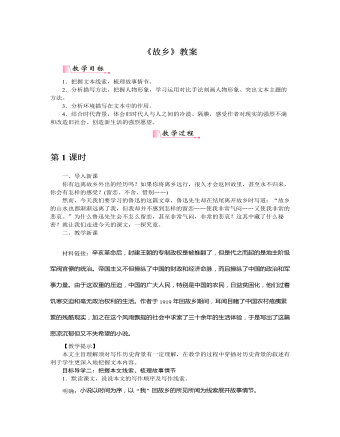
部编版语文九年级上册《故乡》教案
【分析杨二嫂形象】1.昔日的杨二嫂是怎样的一个形象?明确:昔日被称作“豆腐西施”,“擦着白粉”“终日坐着”,是一个安分守己的妇女形象。2.如今的杨二嫂是怎样的形象?作者是从哪些方面刻画的?明确:“凸颧骨”“薄嘴唇”“圆规”等肖像描写,“尖利的怪声”“大叫”“两手搭在髀间”“贵人眼高”等动作和语言描写,表现出了杨二嫂泼悍、放肆、尖刻的性格特征。讨东西、造谣、塞手套又表现出她的自私、泼悍、爱贪小便宜。探究:作者塑造杨二嫂这一形象有什么作用?杨二嫂的形象是作者“悲哀”的源头吗?明确:杨二嫂的变化说明了辛亥革命后,城镇小市民阶层的贫困化,反映了当时社会经济破产的广度和深度。杨二嫂的变化,是不合理制度下的人性转变,如果说闰土是“精神麻木”的状态让作者觉得“悲哀”,那么杨二嫂便是因为失去真善美的人性而使作者觉得“悲哀”。